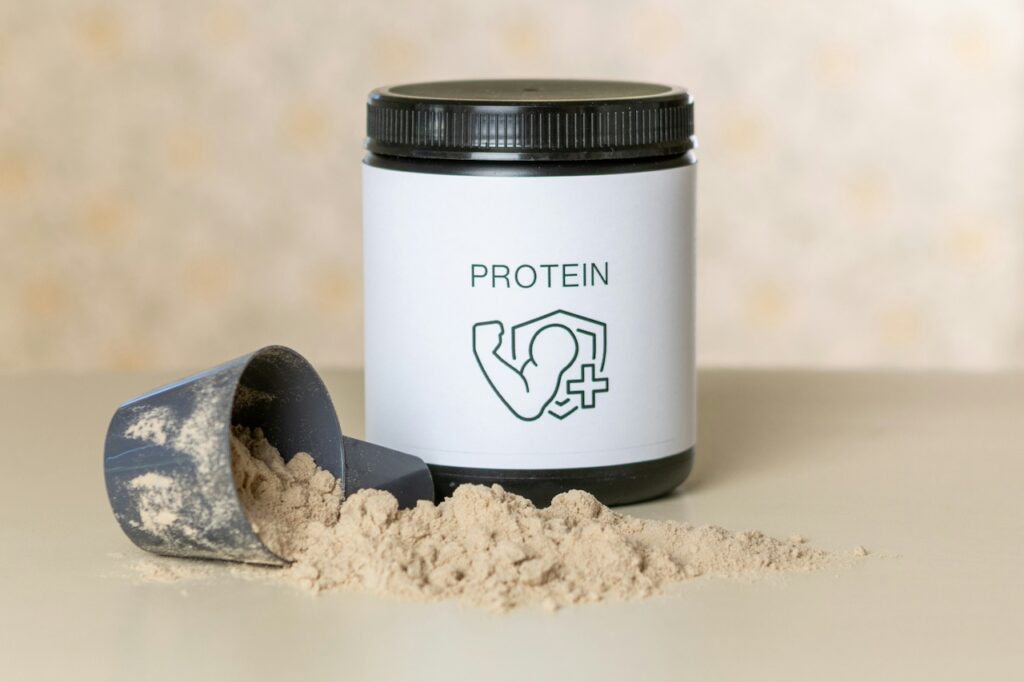
Teens and Protein Powder
Sports supplements are estimated by some market research firms to be a $42 billion/year industry, with some anticipating the sales of sports supplements to be almost $78 billion by 2030. Sports supplements are popular, accessible, and marketed well. While they aren’t specifically marked to teens, they are widely available and used without much thought by teen athletes.
The questions most often asked by parents are:
- Does my teen need protein powder?
- How do I know if it’s safe?
- How much should they use?
Does your active teen need protein powder?
The short answer is, it depends. It depends on diet and activity level.
For most people, protein needs can be met through food. When most people think of protein, foods like chicken, beef, turkey, and fish come to mind, but protein is found in many more foods, including beans, dairy, and nuts.
There is no (that’s right – zero) consensus on how much protein active adolescents need. The daily requirement for protein is 0.8 g/kg of body weight. This recommendation is the amount needed to prevent protein deficiency, not necessarily the amount needed for muscle repair.
There is some research that suggests that the dietary protein recommendation for active teens be 1.4 g/kg/day. The recommendations for adult athletes from the International Society of Sports Nutrition is 1.4 – 2.0 g/kg/day.
Here’s what that looks like:
For a 150 lb (68kg) male or female (divide pounds by 2.2 to find kilograms)
| Calculation for grams/kilogram of body weight | Total grams of protein per day based on calculation |
| 0.8 g/kg (the RDA for protein) | 54.4 grams of protein per day |
| 1.4 g/kg | 95.2 grams of protein per day |
| 1.4-2.0 g/kg (recommended amount for adult athletes by ISSN) | 95 – 136 grams of protein per day |
In looking at the variation in the amounts of protein, do a calculation of your child’s protein requirements based on their body weight. Larger bodies will need more protein and smaller bodies will need less.
Protein in common foods
Knowing the numbers is great, but how does that translate into real life? Your child might be getting more protein than you think, so it’s important to know how much protein is in common foods to make an informed decision about whether or not protein powder supplementation is needed.
| Food | Grams of Protein per serving |
| Chicken Breast (4 ounces) | 31 grams |
| Beef (4 ounces) | 29 grams |
| Shrimp (cooked, 3 ounces) | 20 grams |
| Edamame (1 cup) | 13 grams |
| 2% Milk (8 ounces/1 cup) | 8 grams |
| Peanut butter (2 tablespoons) | 8 grams |
| String cheese | 7 grams |
| Chickpeas (1/2 cup – added to salad or in hummus) | 6 grams |
| One hard-boiled egg | 6 grams |
If your teen is working toward the 95 grams of protein per day, here’s a scenario of how they can get there without protein powder:
- Breakfast: 2 hard boiled eggs, whole wheat toast, strawberries, glass of milk
- Lunch: PB&J on whole wheat, orange, string cheese
- Snack: Hummus and carrots, handful of pistachios
- Dinner: Chicken breast, mashed potatoes, roasted broccoli
Supplementing with protein powder
Supplementing a diet with protein powder or protein drinks might be necessary if your teen fits the following:
- Is a vegetarian or vegan
- Has allergies that limit certain protein-rich foods – such as nuts, whole grain breads containing nuts, or eggs
- Is a picky eater
- Lactose intolerance
- Does not enjoy eating large amounts of animal foods
Safety: How to choose a protein powder or protein drink for teens
If you feel like having a protein powder or protein drink available for your teen, the next step is how to choose one that is safe and makes you feel comfortable.
Dietary supplements, even protein powders, are not tightly regulated by the FDA. There is a small amount of regulation on what supplement companies are allowed to claim, but for the most part, the supplement industry is still the wild wild west.
- Organic. There are tight regulations on the word “organic,” so if your protein powder is certified USDA 100% organic, you can be sure there that the label is truthful. This is not to say that you must buy an organic protein powder, it’s just one thing to look for.
- Third Party Certification: If you can find a protein powder that has this, that means it has been tested by a third party and it’s safe to consume.
- Would you use it? If there is a shred of doubt in your mind about the product you are buying, leave it on the shelf.
How much is enough?
If using a protein powder, follow the recommendations on the package per serving. If choosing a premade protein drink, one per day will be sufficient. Remember, whole foods should be first when it comes to protein, but a protein supplement is meant to “supplement” the food intake. Stick with the protein recommendations for weight listed above and always speak with a dietitian or your pediatrician if you aren’t sure.


